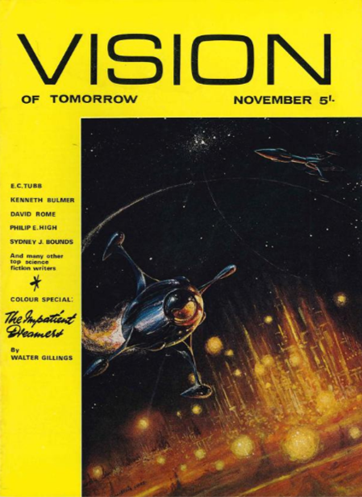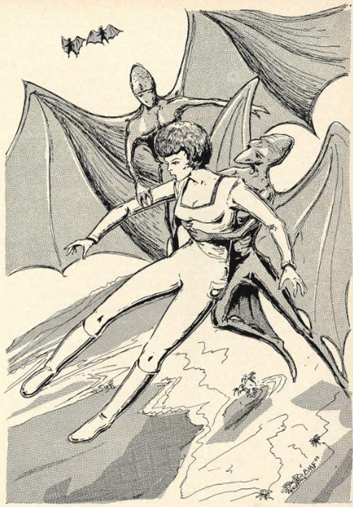
By Mx Kris Vyas-Myall
The Times is running a series of articles where major thinkers elucidate on what they believe life will be like in 1980. The series started with Arthur Koestler (philosopher most known for his Orwellian novel, Darkness at Noon) who predicts that, in the Britain of 1980, Mediocracy will be the order of the day.

Arthur Koestler by David Levine
By this he means that instead of having a meritocratic system, defined by IQ plus effort, the main ingredients of life will be common sense plus inertia. Institutions will continue in modified forms without revolutionary change. Politicians are more likely to be dentists than demagogues. The family structure will continue but divorce and extramarital relationships will be commonplace. Housewives will have “bugs”, small time-saving robots, to do their household tasks, but they will breakdown so frequently the repairman will be a regular guest.
On a more positive note, he foresees the removal of private cars from cities, to be replaced by automated electric vehicles for hire. Office work will be done from home, with tactile simulators introduced to ensure people do not feel deprived of physical contact. Education will begin shortly after birth and young people will be encouraged to engage in more out-there behaviour before settling into mediocre adulthood.
We will have to wait another decade to see if his predictions come true. But, if the latest Vision of Tomorrow is any sign of things to come, mediocrity is certainly on the horizon.

Cover art by Eddie Jones
Yes, I am also still waiting for issue #2. I am assuming there was some hiccough at the printers.
In his editorial, Harbottle continues to outline his vision for the magazine. Firstly, stories must be “entertaining”, secondly, they should not contain sex. New Worlds this is not!
Let’s see how this translates into prose.
Shapers of Men by Kenneth Bulmer

Illustrated by Eddie Jones
Once again, Mr. Bulmer opens the magazine with an adventure tale. This one, we are told, marks the start of a new series. Fletcher Cullen, “galactic bum”, travels across the stars wherever the loot and action take him. In this opening installment, Cullen’s flier is shot down over Sitasz and he finds himself in the middle of a conflict between the humans and the natives.

Illustrated by Eddie Jones
This is a rather old-fashioned kind of interplanetary tale with some attempts at modern touches. Cullen is an untrustworthy rogue, miles away from Flash Godon or Clark Kent, the Sitazans are a well-constructed alien race and there are attempts to bring in modern frames of reference like LSD.
However, it is really boring to read. Generally each chapter will spend most of the time in overwrought descriptions and dull exposition, then a quick escape, followed by a capture by someone else. Even Bulmer’s amusing similes are like fish and guests, starting to smell off after the third time.
A low two stars
Number 7 by Eric C. Williams
Frederick Hasty, technical overseer of demolitions in London, is called to Number 7, Good Peace Road, in New Cross. Its destruction is a necessary part of the rationalization of London currently taking place. Unfortunately, the property is surrounded by an impregnable invisible barrier.
A reasonable little mystery but one that does not amount to very much.
A low three stars
Science Fiction in Germany by Franz Rottensteiner
A one-page summary of the SF scene in both Germanies, covering Perry Rhodan, Utopia Zukunftsromane, translations, fanzines and conventions.
It does the job it intends to but it is not as good as Cora’s coverage.
Three stars
People Like You by David Rome

Illustrated by B. M. Finch
Gail and Gordon Coulton, and their daughter Dorinda, are staying in a holiday home overlooking Cody Canyon when they notice some of their property has been taken. They suspect it is their neighbour, George Abbot. But what could he want with these items?
I was reminded of The People stories, but Rome is no Henderson. It is enjoyable enough, with a nice twist in the tail, but nothing special.
Three Stars
The Impatient Dreamers Part 3: Shadow of the Master by Walter Gillings
With us still waiting for the intervening issue, we skip to the third of Gillings articles, looking here at the emergence of British SF writers and publications in the 1930s, along with his efforts to establish more SF fan clubs.
This continues to be a brilliant series casting a spotlight on an area of SF development I rarely see discussed.
Five Stars
Pioneers of Science Fantasy

Some special colour reprints and short looks at big names in the history of the genre. A kind of supplement to the prior article.
Fantasy Review
Ken Slater reviews the latest E. C. Tubb interstellar adventure, Escape Into Space. Apparently, it is a disappointment, lacking character and convincing explanations.

Illustrated by Gerard Alfo Quinn
Speaking of Tubb, this tale tells of Frank Weston, a morgue attendant who manages to get his hands on a ring of The Special People. These rings are a kind of portable time machine, allowing him to reverse time over a short period. Frank uses it to get rich and powerful, but can it really give him everything he desires?
A pretty standard tale of this type, well told. Once again Ted lands straight in the middle.
Three Stars
The Adapters by Philip E. High

Illustrated by Gerard Alfo Quinn
Roger Pryor is a fugitive from The Invaders. Five years ago, people started falling down totally incapacitated when touched by them. They are huge beings invisible except in very specific temperatures and lighting. They continually tell him they are here to help and rescue him, but what can their real agenda be?
A tense and evocative piece. Not the most original but enjoyable enough to bump it above the general chatter.
A low four stars
The Nixhill Monsters by Brian Waters
Whilst travelling across the Australian outback Alice and Graham swerve to avoid a strange creature, like a glowing transparent humanoid. Stopping in the nearby town they are curious to know more, the townspeople however are determined to kill the monster.
This feels to me like a middle-of-the-road episode of The Twilight Zone, overly simple moral and all. Whilst fairly competently constructed it feels strange that everyone here quickly accepts the existence of an alien, but also wants to murder her simply because she looks weird.
Two stars
World to Conquer by Sydney J. Bounds

Illustrated by BM Finch
With the Earth devastated by radiation poisoning, humanity is desperately searching for a new habitable planet to live on. When they finally find the world of Asylum, it is already occupied by the intelligent Fliers. Leo Crane is sent to meet the inhabitants, to discover how easily they can be exterminated.
Whilst some parts of this are very old-fashioned (Marie’s “I’m a woman” speech is particularly excruciating), I found the scientific concepts involved interesting and the question raised about how humanity treats the worlds it finds worth pondering. By the end you want to ask if we would really have the right to survive?
Evens out at a high Three Stars
Prisoner in the Ice by Brian Stableford

Illustrated by BM Finch
After centuries of battling the encroaching ice, the Earth is finally starting to warm up. On one of these ice sheets three men discover a saber-toothed tiger, frozen in mid-leap.
A much more philosophical story than I was expecting from these pages. The tiger and ice melt are really just metaphors, the main thrust of this piece is a discussion about what people become when they fight to survive. Do they become the winners or merely leftovers?
Interesting to compare and contrast with the previous story.
Four Stars
A Dentist’s Waiting Room

An unusual final image from Dick Howett previewing issue #4
So perhaps common sense and inertia are the tools behind Visions of Tomorrow. I feel like little here would be out of place ten years ago, but it is generally competent. Only the Bulmer I found to have any structural flaws.
Whether this middle of the road approach will work in the long run remains to be seen. Being unobjectionable but unremarkable is not necessarily going to get people to drop their 5 shillings for the next issue. As the architect of the NHS Aneurin Bevan said:
We know what happens to people who stay in the middle of the road. They get run over!




Seems like they found those predictions to be B.S., looking back.
So Koestler essentially is predicting that England in the '70s will be just as bland and mediocre as England in the '60s. This is certainly true on the political, economic and union side as the country becomes more bland and homogenized by two decades of mediocre governments.